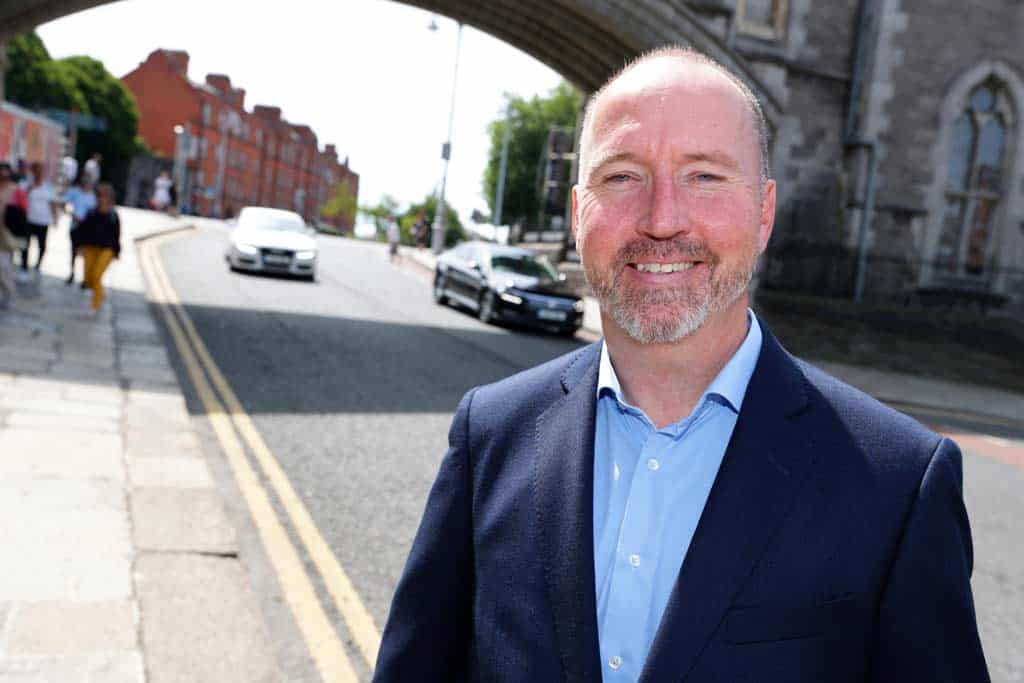Feargal O’Neill, CEO of Gamma
In our next CEO Q&A, Feargal O’Neill, CEO of Gamma, speaks about his biggest challenges, keeping his team motivated and innovation.
I see my main responsibility as facilitating and guiding my highly-skilled, multidisciplinary team to achieve something special in the area of Location Intelligence (LI), which is all to do with data and maps. The aim is to create a legacy that has a significant impact, one that is remembered by customers and respected by peers. To make this happen, I have to ensure that we uphold excellence in everything we do; that we constantly innovate and grow; and that we remain financially stable and competitive now and for many years to come. Keeping focus is a constant challenge for me. I’m a dreamer and inventor by nature so I always want to pursue all of the brilliant product ideas that we devise. Of course that’s not possible when you’re not a Fortune 500 company and don’t have a time machine. That means we need to pick only our best prospects and sideline those that don’t quite meet the standard. This is the only way of getting innovative and impactful products to market. As we start to grow to a respectable size, HR management is also becoming a challenge. It’s fairly easy to run a company with ten or 12 employees but as the workforce grows to more than 20 or 30 people, you have to reassess the ways in which you work and measure success. With multiple geographical markets to consider, the importance of management process, KPIs and systems is absolutely critical. By being open and honest about our plans, objectives and aspirations. People want to know what the game plan is and why they’re turning up for work at eight in the morning and working until late. To ensure transparency and openness, we operate with a flat management structure and nobody is exempt from being challenged. We focus on producing visually-appealing and inventive solutions that people are proud of delivering. We also believe in motivating staff and helping them excel, as well as acknowledging good work and celebrating achievement. Job satisfaction comes from doing interesting work, constantly growing and being appreciated for it. We deliver on all three. Thankfully there are more opportunities than challenges. Changes in relation to data quality and the volumes available are evident as more and more location data is created through IoT and analysis becomes easier and cheaper through cloud computing. The issue, however, is that location data is not curated and checked to the degree it used to be, therefore the danger of substandard information is greater than ever. We only offer high-quality data solutions due to the fact that anything else is potentially very damaging to our clients and the industry’s reputation. As well as an ever-increasing amount of information, there are lots more ways to bring location into the data analytics process nowadays. Technology and data is easily accessible and more cost-effective now. Serverless Geographic Information Systems (GIS) is the new kid on the block and offers great potential in terms of efficiency and scalability. Geographically, huge new markets including China are only starting to apply LI methods to business problems, so it’s an exciting time for the industry as a whole. More open public data. In Ireland, we have lots of government data that could be made available to enable citizens to make better decisions. Access is getting better but more can be done and often the main barrier is a culture of secrecy as opposed to an actual data privacy risk. Such information can be safely and geographically aggregated into GDPR-compliant statistics at a local level. While GDPR is great, as with most new regulatory systems, we have probably gone overboard. We need to find a reasonable level of data-sharing to protect private information while still facilitating useful insight. Good developers are always hard to come by, as are those who work in LI or GIS with knowledge outside of environmental applications. I think the Irish third-level GIS courses focus far too much on environmental applications. Universities like Leeds have commercial GIS courses and a broader scope, but I think that’s lacking in Ireland. I also think we should have far more experienced senior part-time roles in SMEs and start-ups. I reckon most small companies could benefit from a part-time senior HR or PR person for example, perhaps someone who has stepped back from a full-time senior role to raise a family. It was about being nimble and flexible as a company, ready to adapt and batten down the hatches when necessary. Our solutions were still required during the crisis, however there was some pressure around pricing, as well as debts on the smaller client end of the business. In response, we did suspend much of our research and development projects and we realigned our focus at the time, but thankfully nobody was let go and we came out the other side much stronger. Honestly, I don’t know, but I don’t believe it will have a major impact on our UK plans. We are currently developing and implementing a new cloud-hosted LI product in the UK retail sector. But even if I’m wrong in this respect and Brexit has a major impact, we will still have market-tested the product in the most competitive retail market in the EU and, if proven to be a success there, we can roll it out in other markets. Our strategy is always to avoid being over exposed or over dependent in any one area, so it wouldn’t be a disaster if we had to change focus to another location. Financial growth is an obvious indicator that you are doing something right, but the inventor in me loves to see brilliant solutions being created and making a difference for our customers. I like nothing better than to see a client derive significant insights and tangible benefits from the service or product we have provided. It’s akin to watching your child do well in school. It’s also a huge privilege to be in a position and able to offer employment to so many talented people. My drive comes from a sense of responsibility to my team, as well as my family and myself. I’ve found that a fear of failure can give you a good adrenaline boost when you need it as well! It’s a bit clichéd but the best advice I ever received was to become the best at whatever you have a true interest in because the world will eventually pay for your specialism and you’ll be in the enviable position of getting paid for doing what you love. This is as true for businesses as it is for individuals. I think too many talented people are coaxed down traditional and safe professional paths by well-meaning parents. In reality, we’ve enough accountants, we need more tobogganists! I’m glad to say that there are a lot to choose from but three in particular spring to mind. Witnessing Perilfinder’s growth in the Irish insurance sector to become the dominant brand in location risk assessment has been incredibly satisfying. Similarly, seeing Storecast’s growth and development into a fully-fledged product has been gratifying. Finally, watching the team develop into a KPI-driven, ISO-certified operation – and a market leader – has also been very rewarding. Next comes the exciting stuff. I want to take the success we’ve achieved through our core cloud-hosted products in Ireland and roll them out globally. The UK is top of the list and then we’ll set our sights on the rest of the world. The timing is good at the moment, especially for our retail network optimisation platform Storecast, as retailers are seeing the greatest evolution in the physical retail landscape since the dawn of modern retailing. This is something we’re hoping to capitalise on. We can’t wait for 2019 and it should be our greatest year yet in terms of growth as we tackle the export market with gusto for the first time and scale up activities in Ireland. We plan to grow our team by between five and ten next year and revenue by 25% as the last four years of research and development projects start to pay dividend. I’d like Gamma to be well-known in our target retail and insurance sectors in the UK, through Storecast and Perilfinder, and for us to be the go-to LI company across all business sectors in Ireland. I like to aim high!Q. What are your main priorities and goals in your role?
Q. What are your biggest challenges as CEO?
Q. How do you keep your team/staff motivated?
Q. What are the challenges facing the industry/organisation going forward?
Q. What new trends are emerging in your industry?
Q. Are there any major changes you would like to see in your sector?
Q. As an employer are you finding any skills gaps in the market?
Q. How did your strategy develop in the context of the banking crisis and economic crisis?
Q. How will Brexit affect you, or have you started to feel the effects already?
Q. How do you define success and what drives you to succeed?
Q. What’s the best advice you’ve been given, or would give, in business?
Q. What have been your highlights in business over the past year?
Q. What’s next for your company?
Q. What opportunities or plans for growth do you see in 2019?
Q. Where do you want your business/brand to be this time next year?
Become the best at whatever you have a true interest in.
Business & Finance, CEO Q&A
 The Sales Institute is delighted to support the CEO Q&A, highlighting the very best in Irish Leadership.
The Sales Institute is delighted to support the CEO Q&A, highlighting the very best in Irish Leadership.
For further details, see www.salesinstitute.ie







